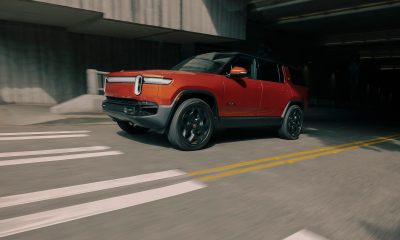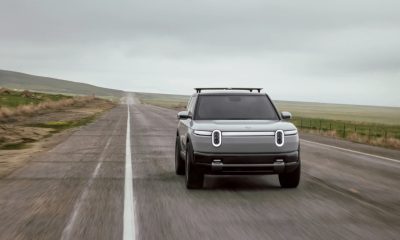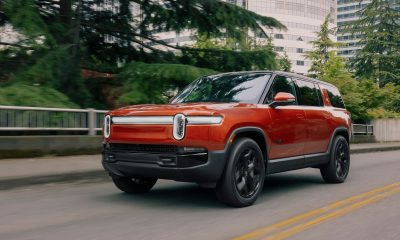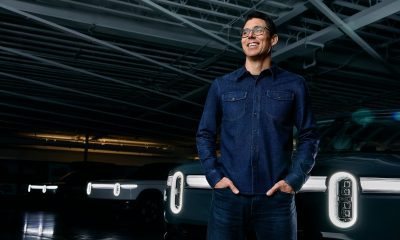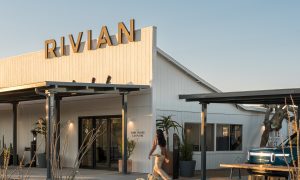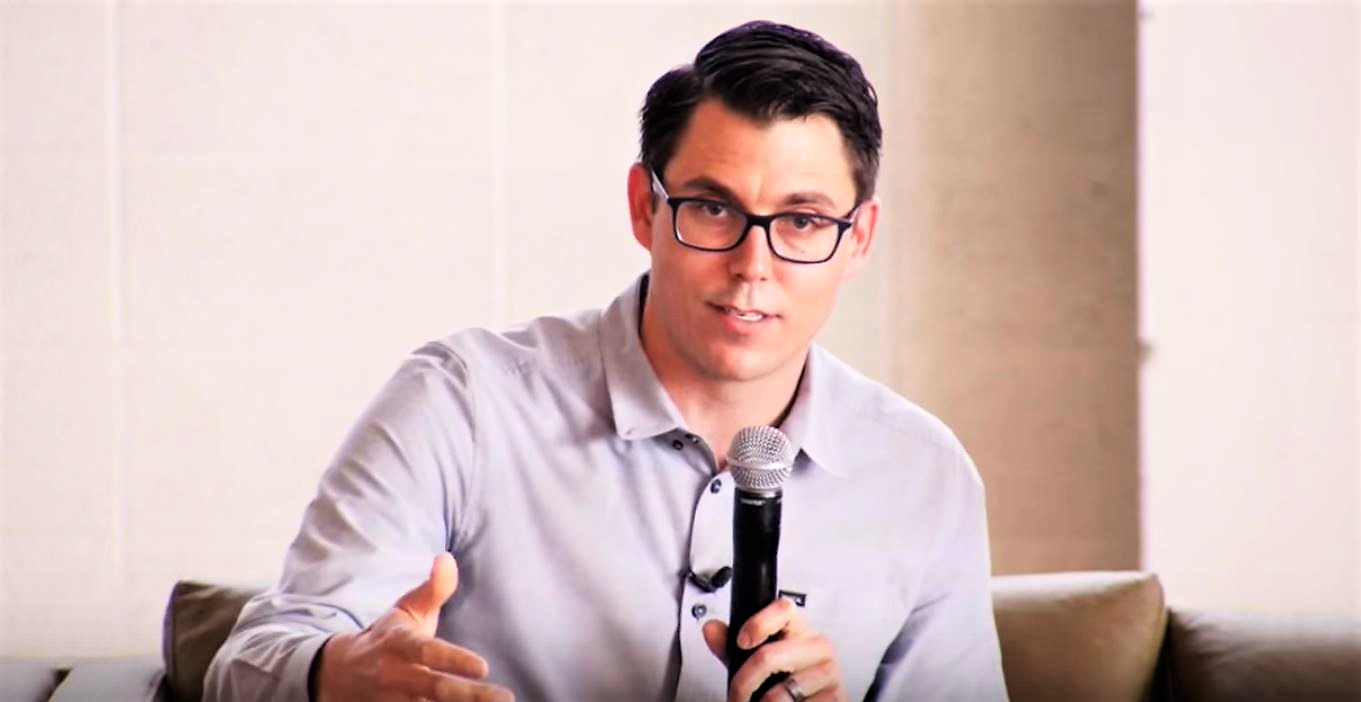

News
Rivian’s RJ Scaringe talks on-site farming plans for employees, battery storage solutions
Rivian CEO RJ Scaringe recently shared insights about the company’s psychology in a livestreamed conversation with professional rock climber Alex Honnold and Rich Roll, a long-time wellness advocate and endurance athlete. As Rivian develops the manufacturing capabilities necessary to build its all-electric R1T pickup truck and R1S SUV at market scale, serious consideration is going into how to harness their team’s energy into an industrial system that works for everyone involved.
“So, industrial systems you have very often are very much class-based system – the white collar workforce, the blue collar workforce – there’s a whole host of things that lead those two sides to often having friction. We see how unions have come in to sort of help try to make those two work a little bit better together. But, a big part of what we’re doing right now is actually mapping out and thinking about the psychology of our company and the psychology of this facility,” Scaringe detailed during the event.
One of the unique things Rivian has inherited during its growth into a full-fledged auto manufacturer is the work force from the 2.6 million square foot plant the company purchased from Mitsubishi. Scaringe described the human story of the facility as “remarkable”, citing how many of the people currently there were part of the original launch team that later had to shut the facility down.
“So, 1989-1990, there are people that are 21-22 years old, they launched the facility….25-30 years go by, they’re part of the team running it, building it, now have to shut this facility down,” Scaringe described. “When we bought the facility, we not only just got the hardware, the acreages of land…[Now] we’ve got a team of people that’s passionate about restarting the facility.”
The company hopes the motivation to restart the plant under a Rivian badge will carry over into a win-win for all involved.

“It’s really remarkable. I mean, I think we’ve got a gift to work with in terms of that level of energy and that passion to bring it back to life,” the CEO said. “As we think about how do we take this gift that we’ve been given in terms of a workforce that’s so motivated, and how do we challenge a lot of the conventions that have been built up in terms of industrial systems…we’re doing a lot of things in the facility to really take that energy and supercharge it, really harvest it.”
One of the ideas Rivian is working to benefit on-site employees utilizes the resources inherited from the plant itself. The acreage surrounding the actual facility isn’t entirely needed for production purposes, so the car maker is planning to partner with local universities for food production from ground to plate.
“We have 508 acres at the plant, a very small percent of which actually has the plant occupying it – most of it’s just grass. We’re gonna be turning a lot of that into an area to grow food. And we’re gonna run that in partnership with some of the local universities through their agriculture programs to grow food locally on our site…and then that food’s gonna be served in our facility with students that are learning from top chefs we’re bringing in to run the food services in our facility, and we’re gonna provide incredible food to our plant team regardless of what part of the plant you work in,” Scaringe revealed.
“[That way]…there’s true equity. Every employee is part of this mission of bringing this facility back up. And that positive energy that we’re establishing at the plant, we want it to be a benchmark for how industrial systems are run – the collaboration, the communication between groups, between our other facilities.”
The conversation with Rich Roll and Alex Honnold primarily involved another part of the company’s psychology – helping to accelerate widespread adoption of renewable energy. Rivian has partnered with the Honnold Foundation to use the electric truck maker’s “second-life” auto batteries for a micro-grid solar system in Adjuntas, Puerto Rico. Through this project and others in the future, older battery cells that are no longer efficient for electric vehicles are repurposed into stationary energy storage units.
Adjuntas was selected as their first project site due to the town’s need for energy assistance after struggling in the wake of Hurricane Maria in 2017. The Honnold Foundation and Rivian will be using 135 kWh battery packs from R1T and R1S development vehicles for that particular grid project; however, cells going into Rivian’s production vehicles have been purposefully designed to have a “second life” in energy storage. The move towards energy projects marks a huge step for Rivian, signaling its expansion beyond the manufacture of all-electric luxury adventure vehicles.
Rivian’s first vehicle deliveries to customers are still planned for the end of 2020. Scaringe said during the event that around 800 members of their preorder community, i.e., reservation holders, were in attendance at the event with Roll and Honnold, so a further manufacturing update was provided with that in mind.
“There’s a lot of stuff happening [at the plant]. We’re moving equipment, we’re putting new equipment in. We’ve got amazingly talented people working day and night to bring that facility up and start delivering cars as quickly as possible,” he promised.
Watch RJ Scaringe, Alex Honnold, and Rich Roll discuss the Honnold Foundation and Rivian’s facility details in the video below:
News
Tesla cleared in Canada EV rebate investigation
Tesla has been cleared in an investigation into the company’s staggering number of EV rebate claims in Canada in January.

Canadian officials have cleared Tesla following an investigation into a large number of claims submitted to the country’s electric vehicle (EV) rebates earlier this year.
Transport Canada has ruled that there was no evidence of fraud after Tesla submitted 8,653 EV rebate claims for the country’s Incentives for Zero-Emission Vehicles (iZEV) program, as detailed in a report on Friday from The Globe and Mail. Despite the huge number of claims, Canadian authorities have found that the figure represented vehicles that had been delivered prior to the submission deadline for the program.
According to Transport Minister Chrystia Freeland, the claims “were determined to legitimately represent cars sold before January 12,” which was the final day for OEMs to submit these claims before the government suspended the program.
Upon initial reporting of the Tesla claims submitted in January, it was estimated that they were valued at around $43 million. In March, Freeland and Transport Canada opened the investigation into Tesla, noting that they would be freezing the rebate payments until the claims were found to be valid.
READ MORE ON ELECTRIC VEHICLES: EVs getting cleaner more quickly than expected in Europe: study
Huw Williams, Canadian Automobile Dealers Association Public Affairs Director, accepted the results of the investigation, while also questioning how Tesla knew to submit the claims that weekend, just before the program ran out.
“I think there’s a larger question as to how Tesla knew to run those through on that weekend,” Williams said. “It doesn’t appear to me that we have an investigation into any communication between Transport Canada and Tesla, between officials who may have shared information inappropriately.”
Tesla sales have been down in Canada for the first half of this year, amidst turmoil between the country and the Trump administration’s tariffs. Although Elon Musk has since stepped back from his role with the administration, a number of companies and officials in Canada were calling for a boycott of Tesla’s vehicles earlier this year, due in part to his association with Trump.
News
Tesla Semis to get 18 new Megachargers at this PepsiCo plant
PepsiCo is set to add more Tesla Semi Megachargers, this time at a facility in North Carolina.

Tesla partner PepsiCo is set to build new Semi charging stations at one of its manufacturing sites, as revealed in new permitting plans shared this week.
On Friday, Tesla charging station scout MarcoRP shared plans on X for 18 Semi Megacharging stalls at PepsiCo’s facility in Charlotte, North Carolina, coming as the latest update plans for the company’s increasingly electrified fleet. The stalls are set to be built side by side, along with three Tesla Megapack grid-scale battery systems.
The plans also note the faster charging speeds for the chargers, which can charge the Class 8 Semi at speeds of up to 1MW. Tesla says that the speed can charge the Semi back to roughly 70 percent in around 30 minutes.
You can see the site plans for the PepsiCo North Carolina Megacharger below.

Credit: PepsiCo (via MarcoRPi1 on X)

Credit: PepsiCo (via MarcoRPi1 on X)
READ MORE ON THE TESLA SEMI: Tesla to build Semi Megacharger station in Southern California
PepsiCo’s Tesla Semi fleet, other Megachargers, and initial tests and deliveries
PepsiCo was the first external customer to take delivery of Tesla’s Semis back in 2023, starting with just an initial order of 15. Since then, the company has continued to expand the fleet, recently taking delivery of an additional 50 units in California. The PepsiCo fleet was up to around 86 units as of last year, according to statements from Semi Senior Manager Dan Priestley.
Additionally, the company has similar Megachargers at its facilities in Modesto, Sacramento, and Fresno, California, and Tesla also submitted plans for approval to build 12 new Megacharging stalls in Los Angeles County.
Over the past couple of years, Tesla has also been delivering the electric Class 8 units to a number of other companies for pilot programs, and Priestley shared some results from PepsiCo’s initial Semi tests last year. Notably, the executive spoke with a handful of PepsiCo workers who said they really liked the Semi and wouldn’t plan on going back to diesel trucks.
The company is also nearing completion of a higher-volume Semi plant at its Gigafactory in Nevada, which is expected to eventually have an annual production capacity of 50,000 Semi units.
Tesla executive teases plan to further electrify supply chain
News
Tesla sales soar in Norway with new Model Y leading the charge
Tesla recorded a 54% year-over-year jump in new vehicle registrations in June.

Tesla is seeing strong momentum in Norway, with sales of the new Model Y helping the company maintain dominance in one of the world’s most electric vehicle-friendly markets.
Model Y upgrades and consumer preferences
According to the Norwegian Road Federation (OFV), Tesla recorded a 54% year-over-year jump in new vehicle registrations in June. The Model Y led the charge, posting a 115% increase compared to the same period last year. Tesla Norway’s growth was even more notable in May, with sales surging a whopping 213%, as noted in a CNBC report.
Christina Bu, secretary general of the Norwegian EV Association (NEVA), stated that Tesla’s strong market performance was partly due to the updated Model Y, which is really just a good car, period.
“I think it just has to do with the fact that they deliver a car which has quite a lot of value for money and is what Norwegians need. What Norwegians need, a large luggage space, all wheel drive, and a tow hitch, high ground clearance as well. In addition, quite good digital solutions which people have gotten used to, and also a charging network,” she said.
Tesla in Europe
Tesla’s success in Norway is supported by long-standing government incentives for EV adoption, including exemptions from VAT, road toll discounts, and access to bus lanes. Public and home charging infrastructure is also widely available, making the EV ownership experience in the country very convenient.
Tesla’s performance in Europe is still a mixed bag, with markets like Germany and France still seeing declines in recent months. In areas such as Norway, Spain, and Portugal, however, Tesla’s new car registrations are rising. Spain’s sales rose 61% and Portugal’s sales rose 7% last month. This suggests that regional demand may be stabilizing or rebounding in pockets of Europe.
-

 Elon Musk2 weeks ago
Elon Musk2 weeks agoTesla investors will be shocked by Jim Cramer’s latest assessment
-

 Elon Musk2 days ago
Elon Musk2 days agoxAI launches Grok 4 with new $300/month SuperGrok Heavy subscription
-

 Elon Musk4 days ago
Elon Musk4 days agoElon Musk confirms Grok 4 launch on July 9 with livestream event
-

 News1 week ago
News1 week agoTesla Model 3 ranks as the safest new car in Europe for 2025, per Euro NCAP tests
-

 Elon Musk2 weeks ago
Elon Musk2 weeks agoA Tesla just delivered itself to a customer autonomously, Elon Musk confirms
-

 Elon Musk1 week ago
Elon Musk1 week agoxAI’s Memphis data center receives air permit despite community criticism
-

 News2 weeks ago
News2 weeks agoXiaomi CEO congratulates Tesla on first FSD delivery: “We have to continue learning!”
-

 Investor's Corner2 weeks ago
Investor's Corner2 weeks agoTesla gets $475 price target from Benchmark amid initial Robotaxi rollout


